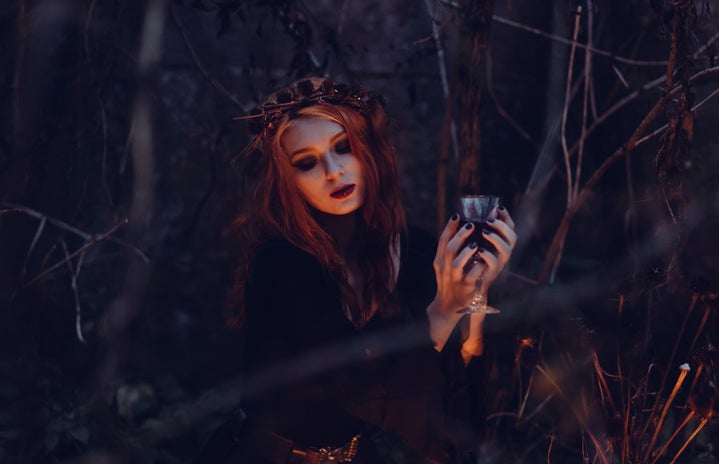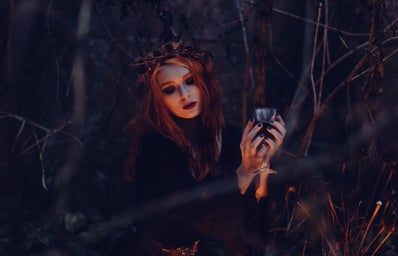Most people know about the witch trials; or have, at least, heard about them. They consisted of the prosecution of people—mostly women—who were accused of witchcraft after the spread of an unknown illness around the 1690s. Since the doctors at that time didn’t know what was happening and what was causing so many young girls to twist and scream in pain, they diagnosed them with bewitchment. This “curse” was an epidemic of smallpox in the Salem Village. There was also a lot of tension and hysteria, as a result of a war between Britain and France in the American colonies as well as the fear of being attacked by the Native American tribes. There was a lot going on, so they thought that the Devil had taken over their town and had granted these women the power to harm others in a secret manner. By the end of the witch-hunt, there were 19 hanged “witches” and many others that were imprisoned. The truth about this event is that, yes, there were witches, but many of the accused women were actually just scientists, sex workers and doctors who couldn’t practice their profession because of their sex.
Many of the women accused of being witches were just females who were different from what society expected them to be. For example, Bridget Bishop was accused of witchcraft because she liked to wear red dresses—different from the all-black outfits that were commonly worn in that time—and had a feisty personality. Bridget was a strong independent woman who didn’t fit in the standards of the seventeenth-century society. Her husband was abusive, so that’s why she learned to fight for her life. People started to fear her when her husband died of illness after a strong fight, whereupon he accused her of being a bad wife who insulted him with names such as “old devil.” Bridget became a businesswoman after her husband died because she needed the money, so she started selling his properties. She was so successful that her neighbors started to get envious, so they accused her of numerous witchcraft practices until she was executed.
Rebbeca Nurse was a well-known 71-year-old grandma in the town of Salem who was accused of witchcraft because apparently her spirit would bother the people in town at night. The reason for which she was blamed lies actually in the fact that there were many people who were interested in the farm where she lived with her husband, and this was the easiest way to get her out of the way. This farm had been a topic of controversy before, as the neighbors would often claim that it violated the boundaries of their land. Historians say that Rebbeca Nurse was an exemplary woman, who possessed far too much knowledge for the times she lived in. This leads to thinking that intelligence was almost illegal for a woman, because knowledge is power.
The fear of what’s different was such that even the foreigners were accused of witchcraft. That is the case of Susannah Martin, a woman who moved to Salem with her family, who were some of the first colonizers. This could be an explanation as to why people resented her so much since the beginning. Many folks in town described her as a troublemaker, very much alike to Bridget Bishop. She seemed to be a beautiful woman, because men in town started to dream about her and this is why she was accused of witchcraft. Apparently, “her spirit was tormenting their wives at night.” She was also accused of fornication and having and killing illegitimate babies. Susannah gave birth to eight children, so the accusation of killing babies was probably founded in her having had involuntary abortions. Some said that she could make her body change, as they had seen her breasts increase and decrease in size. Let’s remember that she had 8 babies, and it was obvious that her body would change! Susannah was outspoken and defiant and she didn’t tolerate slander, so she was fighting with people constantly because of this. I think that, overall, she was a mother who was just trying to be a good woman and a defender of injustice.
It was very common for nurses to be accused of witchcraft because of the nature of that profession. In those times, there weren’t many resources other than organic ingredients to create remedies. People then resorted to herbs, minerals, and ointments as cures for illnesses. This was frowned upon because obviously the upper class had doctors who needed to get paid. There were healers almost everywhere, although most of them were women because they weren’t allowed to work, and so they were housewives who had the time to look for the resources to create natural cures. This was the story of Ann Pudeator, who was a nurse and a midwife. Because of her occupation, she was being suspected as a witch. As a midwife, she had witnessed many babies and mothers die during birth due to complications, so this was enough proof of being part of the “evil.” Ann was a victim of the witch trials because of rumors of making voodoo dolls, owning ointments, shapeshifting, bothering girls in spirit form, killing people and bewitchment. Clearly, “witches” were women who wanted to help and be useful in a misogynistic society.
“Witches” were often women who were too poor, too rich, too pretty or even too feminine. The Puritans had a belief that women were most likely to become witches because they were the “weak gender,” so they were easier to get tempted by the Devil. Anything outside of the social rules enforced by men could be a sign of witchcraft: being wealthy meant being a prostitute or involvement in illegal issues, having many children meant the woman in question had made a deal with the Devil, and not having children meant a curse. When a woman was too free or too pretty, she was accused of bewitchment. Men probably looked for an excuse for “not being able to control themselves around her”. Expressing their opinion and standing up for themselves seemed like a possession. It sounds to me that men feared the power these women could have on them. Witches were just victims of a civilization controlled by patriarchy.


